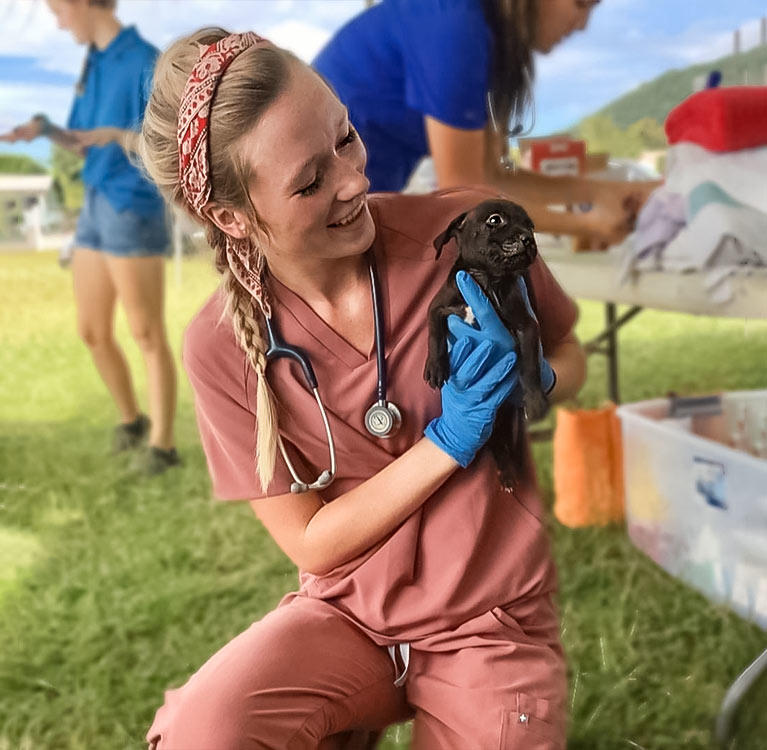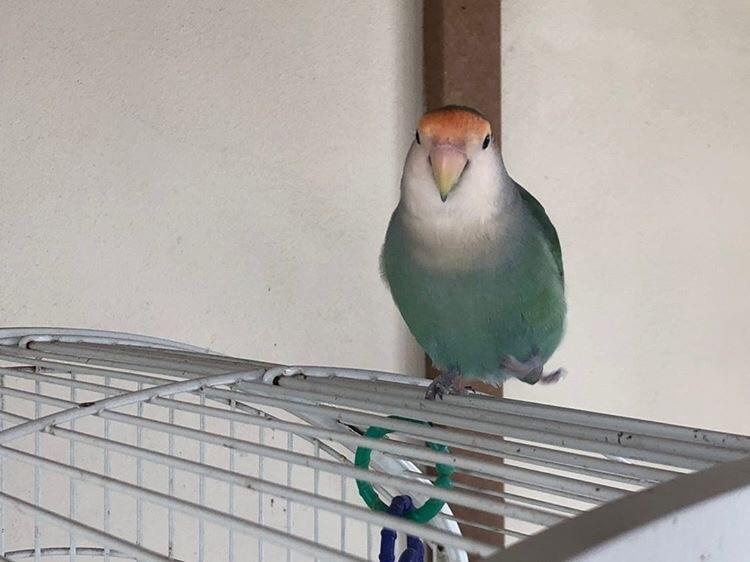Regular wellness exams are essential to maintaining the overall health and well-being of canines. During these exams, veterinarians evaluate a dog’s overall health to ensure it is developing properly. Vets conduct physical exams, blood tests, and additional procedures as necessary to ensure each dog is as healthy and happy as possible.
How Often Should Dogs Have a Wellness Exam?
Puppies undergo wellness examinations more frequently than adults and elderly dogs. Within their first six months, puppies often have monthly visits. These visits are vital for identifying potential inherited defects, for deworming, and to better understand health issues each young dog may face.
During a puppy’s first six months, it is often vaccinated and neutered or spayed to prevent later unwanted pregnancies.
Canine wellness exams are usually performed annually on healthy adult dogs, while senior dogs often receive semi-annual visits. Older dogs are more susceptible to disease or illness and can suffer from such ailments as arthritis or cataracts. Canine wellness exams are an excellent chance for veterinarians to spot subtle health changes pet owners may miss.
As with humans, early diagnosis of medical conditions in dogs is key to providing effective and potentially lifesaving treatment.
What Happens During a Canine Wellness Exam?
During a canine wellness exam, a veterinarian will ask pet owners about their dog’s behavior, diet, habits, lifestyle, and elimination patterns. The veterinarian will then perform a physical exam by checking the dog’s ears, eyes, nose, and teeth. They will take the dog’s weight and temperature, test fecal matter samples, test for internal parasites such as heartworms, and feel for abnormalities in the dog’s body.
Vets will note any reactions the dog may have to unusually painful or sensitive areas.
Veterinarians will examine a dog’s cardiovascular and respiratory health as well as its mobility. Vets may also perform biochemistry profiles, thyroid hormone testing, urinalysis, and a complete blood panel.
Based on the exam as well as the dog’s history and needs, the veterinarian may make recommendations for treatments regarding:
- Dental care
- Joint health
- Nutrition
- Parasite control
- Skin and coat care
- Weight management
- Vaccinations
- And more
The veterinarian may also discuss a dog’s circumstances and recommend appropriate lifestyle changes. Canine wellness exams cater to each specific dog, but all generally follow guidelines created by the American Veterinary Medical Association (AVMA). Veterinarians often use the Canine Life Stage Health Checklist created by the American Animal Hospital Association (AAHA) to ensure pet owners are well informed and that dogs remain happy and healthy.
Veterinarians keep tabs on the latest protocols and advances in veterinary medicine to continue providing high-quality care to their patients.
What Are Common Canine Health Problems?
Dogs may suffer from inherited, naturally occurring, and contracted ailments. They may even fall ill from hazards within the home. Common hereditary and naturally occurring conditions veterinarians treat include:
- Allergies
- Diabetes
- Hemangiosarcoma (HSA)
- Hip and elbow dysplasia
- Hypothyroidism
- Inflammatory bowel disease (IBD)
- Lymphoma
- Mast cell tumors
- Mitral valve disease
- Non-struvite bladder stones
- Osteosarcoma
- Patella luxation
- Retained testicles
- Umbilical hernias
Dogs who spend a lot of time outdoors inevitably encounter other dogs and outdoor hazards. This can present such additional risks as:
- Canine distemper, influenza, or parvovirus
- Exposure to toxic fertilizers, pesticides, and plants
- Exposure to wildlife risks, feral animals, and ticks
- Heartworm
- Heatstroke
- Injuries
- Intestinal parasites
- Kennel cough
- Leptospirosis
- Rabies
- Ringworm
- Tick-borne diseases
Dogs can also face threats in the home, which is why owners should be vigilant when dog-proofing their houses. The following foods and drinks are commonly found in many homes, but they can be dangerous if consumed by a dog:
- Alcohol
- Artificial sweeteners such as xylitol
- Avocados
- Coffee grounds
- Chocolate
- Fatty foods
- Garlic
- Grapes and raisins
- Macadamia nuts
- Onions
- Salt
- Tea
- Yeast dough
Keeping a curious dog away from garbage can prevent accidental food poisoning and other health complications. When proofing their home, owners should ensure the following are nowhere near the dog’s reach:
- Adhesives
- Alkaline batteries
- Copper pennies with zinc
- Herbicides, insecticides, and rodenticides
- Indoor plants
- Liquid potpourri
- Medications
- Mothballs
- Paints and solvents
- Soaps and toiletries
- Tobacco products
Canine Behavior and Mental Health
A dog’s behavior can have a large impact on its mental health and quality of life. A well-behaved dog is often a happy dog. Poor animal behavior can cause emotional or mental distress for a dog as well as its owner.
A veterinarian can help owners who have trouble training their dogs discover the reasons behind their pet’s behavior. They can provide solutions to such common behavioral issues as:
- Aggression
- Barking
- Biting
- Difficulty walking on a leash
- Fear of strangers
- Fear of storms
- Jumping on people
- Noise, separation, or social anxiety
- Timidity
- Trouble housetraining
Like humans, a dog’s happiness can be affected by such lifestyle changes as the birth or death of a loved one (human or animal) or moving to a new home. Illness, physical pain, confinement, disorders, and abuse can also negatively impact a dog’s mental health. Dogs can suffer from anxiety, depression, and obsessive-compulsive disorder.
Unhappy dogs may appear listless and refuse to eat or exercise, or they may hide, tremble, or suffer from diarrhea or vomiting. Depression and stress can cause skin problems and even shorten a dog’s life.
To help with these mental health issues, a veterinarian may recommend more exercise as well as extra attention and gentle contact. They may also encourage owners to provide massages and allow the dog to indulge more in things it enjoys such as playing, running, or chewing on a favorite toy.
Becoming a Veterinarian
Becoming a veterinarian is an excellent way to personally contribute to the health and well-being of all pets. Those interested in becoming a veterinarian should attend an AVMA-accredited Doctor of Veterinary Medicine (DVM) program such as the one offered at Ross University School of Veterinary Medicine* (Ross Vet). Ross Vet’s DVM program can be completed in a little over three years.
Throughout this program, we recommend those interested in treating dogs and cats focus on companion and small animal medicine. There are also opportunities to work with campus teaching dogs throughout your Doctor of Veterinary Medicine (DVM) curriculum.
After earning their DVM degree, graduates must pass the North American Veterinary Licensing Examination® (NAVLE®) to earn licensure. Licensed DVMs must meet their state’s requirements for competence and conduct before they can begin practicing veterinary medicine. Veterinarians may be certified by the American Board of Veterinary Practitioners as well as their specialty board. Vets may also apply for membership in the AVMA and other professional societies.
Take the next step on your path to becoming a companion and small animal veterinarian: apply for admission to Ross Vet.
*Ross University School of Veterinary Medicine provides an accelerated, broad-based curriculum that integrates unique research opportunities, classroom study, and hands-on clinical training.
Ross University School of Veterinary Medicine confers a Doctor of Veterinary Medicine (DVM) degree, which is accredited by the American Veterinary Medical Association Council on Education (AVMA COE), 1931 N. Meacham Road, Suite 100, Schaumburg, IL 60173, Tel: 800.248.2862. For more information please visit https://www.avma.org/education/accreditation-veterinary-colleges.
The AVMA COE uses defined standards to evaluate veterinary medical education programs, including facilities, clinical resources, curriculum, faculty, student outcomes and research programs. The standards are interpreted and applied by the AVMA COE- accredited veterinary medical education programs in relation to its mission.






